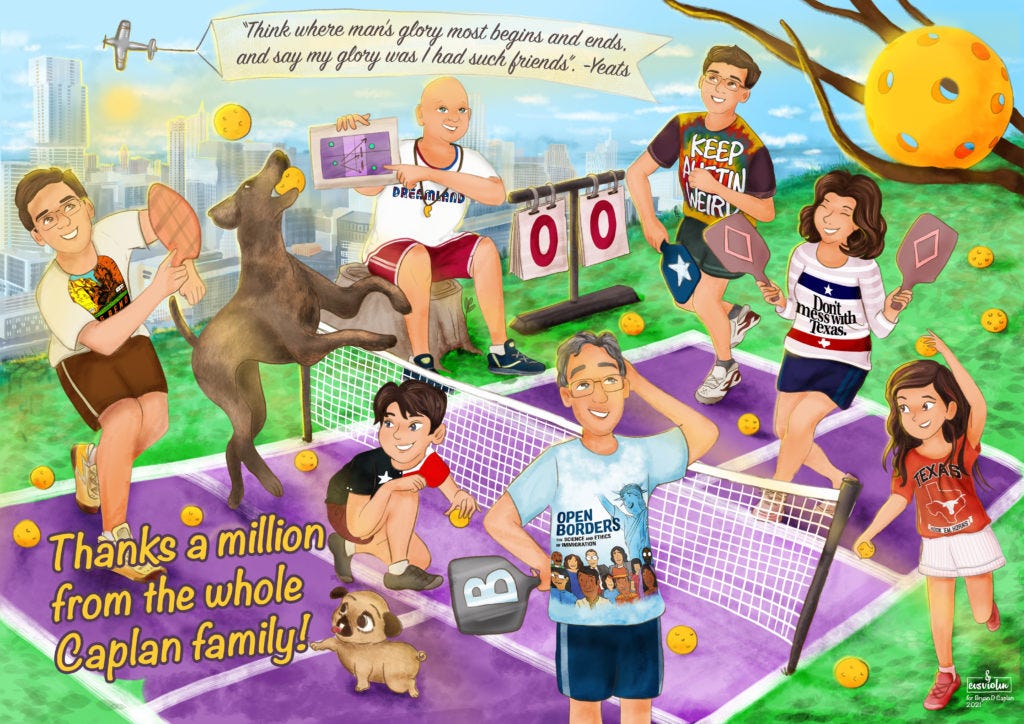What I Did in My 40s
Today I turn 50, which makes little sense to me. I can’t be 50, because that’s how old my dad is, right?
Anyway, ten years ago I shared 40 things I learned in my first 40 years. Today I’m just going to look back over the last ten. What did I do with my decade?
1. Most importantly, I had my fourth child. Sweetness and light, a daily joy. I can tell that many parents’ appreciation for their children is heavily laden with Social Desirability Bias. But not mine.
2. I published Selfish Reasons to Have More Kids: Why Being a Great Parent Is Less Work and More Fun Than You Think. This remains my least-cited book, but will almost certainly be the one that adds the most value to the world. Dozens of people have told me I actually convinced them to have another kid. And according to this Twitter poll, my words have caused the births of over a hundred new souls. Using standard value of life calculations, that’s about a billion dollars worth of value for the world.
How many additional children have my arguments in *Selfish Reasons to Have More Kids* caused you to have? https://t.co/TwDBLRiADM
— Bryan Caplan (@bryan_caplan) July 29, 2020
3. I wrote and published The Case Against Education: Why the Education System is a Waste of Time and Money. While I’m unlikely to transform academic opinion on this issue, it’s already getting hundreds of citations, partly because researchers are starting to feel obliged to acknowledge that educational signaling might be important. And perhaps it will slightly slow the policy juggernaut of educational profligacy.
4. I wrote and published Open Borders: The Science and Ethics of Immigration. Definitely my most persuasive work. Though given the inherent difficulty of persuading anyone of anything important, perhaps I should say “least unpersuasive.”
5. As I wrote Open Borders, I acquired a whole toolkit of visual storytelling skills. Educational psychology notwithstanding, I successfully took what I learned as a consumer of graphic novels and transferred it to actually producing graphic novels. Better yet, I was patiently mentored by my collaborator, the great Zach Weinersmith.
6. I homeschooled my elder sons, starting with middle school and continuing through high school. The time commitment was modest, but I would have gladly done much more. As I often told my favorite students, “You are not an interruption of my work. You are my work.” During these six years, I’ve given my sons an immense knowledge base. Besides standard fare, they have wide-ranging knowledge of social science, speak fluent Spanish, and know human history forwards and backwards. Their first academic publication came out yesterday. And the college application process turned out very well indeed, though I’m not going to say much more until they show up on campus.
7. I also taught my eldest a great deal about how to win friends and influence people. Some lectures, but mostly learning by doing. That’s how they recruited so many eminent historians for their History Twins Podcast. Along the way, I spent many hours teaching them how to game the corrupt boondoggle that is academia.
8. I started homeschooling my younger kids a year ago due to COVID. Though I’m plainly less suited for teaching elementary subjects, my newest students are learning far more than they did at FCPS. And they spend about 60% as much time on schoolwork as they used to. Through herculean efforts, I’ve also rounded up enough playmates for my kids to have a decent childhood in our dystopian age. All the parents who used to fret about homeschoolers “lack of socialization” really should look in the mirror. I know quite a few kids whose parents have isolated them from other kids for over a year. My homeschoolers, in contrast, get to play with other kids all the time.
9. I’ve made many new friends all over the world, even during COVID. Especially the surreally awesome Steve Kuhn. Like the painting says, Steve, thanks a million!
The post appeared first on Econlib.


